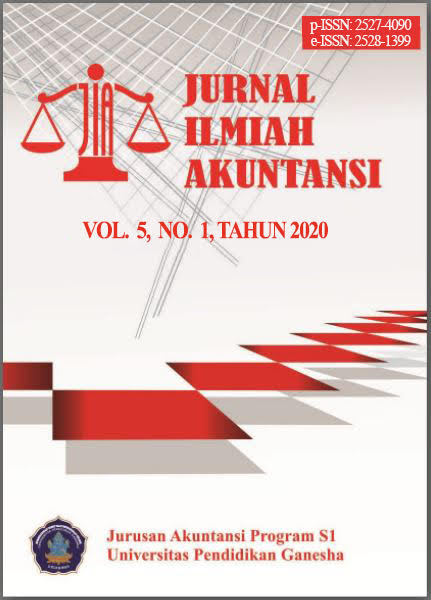Faktor-faktor Penentu Tarif Biaya Audit Eksternal (Audit Fee) pada Perusahaan Non-Keuangan
DOI:
https://doi.org/10.23887/jia.v5i1.24543Abstract
The results of previous studies still indicate inconsistencies related to the determinants of the audit fee. The aims of this research is to examine the effect of company political connection, the existence of independent board commissioner, company complexity, public accounting firm size, and company profitability on the audit fee in non-financial companies listed in the Indonesia Stock Exchange on 2016-2018. The sampling technique that used in this research was purposive sampling and produced the number of sample was 130 companies. The data were analyzed by using multiple linear regression analysis. The results show that political connection, company complexity and public accounting firm size positively influence the audit fee. Meanwhile, the existence of independent board commissioner and company profitability do not affect the audit fee.References
Chandra, M. O. (2015). Pengaruh Good Corporate Governance, Karakteristik Perusahaan dan Ukuran KAP Terhadap Fee Audit Eksternal. Jurnal Akuntansi Bisnis, 13(26), 174–194.
Cristansy, J., & Ardiati, A. Y. (2017). Pengaruh Kompleksitas Perusahaan, Ukuran Perusahaan, dan Ukuran KAP terhadap Fee Audit pada Perusahaan Manufaktur yang Terdaftar di BEI Tahun 2012-2016. MODUS-Jurnal Ekonomi Dan Bisnis, 30(2), 198–211.
El-Gammal, W. (2012). Determinants of Audit Fees: Evidence from Lebanon. International Business Research, 5(11), 136–145.
Fitriana. (2018). Pengaruh Risiko Litigasi, Corporate Governance, Karakteristik Perusahaan, dan Karakteristik Auditor terhadap Audit fee (Studi pada Perusahaan yang Terdaftar di Bursa Efek Indonesia tahun 2014-2017). Universitas Muria Kudus.
Ghozali, I. (2016). Aplikasi Analisis Multivariete Dengan Program IBM SPSS 23 (Edisi 8). In Universitas Diponegoro. Semarang: Badan Penerbit Universitas Diponegoro.
Gomez, E. T. (2014). Malaysia’s Political Economy Ownership and Control of the Corporate Sector. In S. Lemière (Ed.), Misplaced Democracy: Malaysian Politics and People (pp. 245–282). Selangor, Malaysia: Strategic Information and Research Development Centre.
Hartono, J. (2017). Metodologi Penelitian Bisnis (6th ed.). Yogyakarta: BPFE.
Immanuel, R., & Yuyetta, E. N. A. (2014). Analisis Faktor-faktor yang Mempengaruhi Penetapan Audit Fee (Studi Empirik Pada Perusahaan Manufaktur di BEI). Diponegoro Journal of Accounting, 3(3), 816–827.
Institut Akuntan Publik Indonesia. Surat Keputusan Ketua Umum IAPI Nomor:KEP.024/IAPI/VII/2008 Tentang Kebijakan Penentuan Fee Audit. , (2008).
Jensen, M. C., & Meckling, W. H. (1976). Theory of the firm: Managerial Behavior, Agency Costs and Ownership Structure. Journal of Financial Economics, 13, 305–360. https://doi.org/10.1016/0304-405X(76)90026-X
Jusup, A. H. (2014). Auditing (Pengauditan Berbasis ISA). Yogyakarta: Sekolah Tinggi Ilmu Manajemen YPKN.
Khan, N. I., Devi, S. S., & Meng, C. W. (2015). Politically Connected Firms and External Audit Fees in Malaysia: An Internal Audit Function Perspective. Malaysian Accounting Review (MAR), 14(1), 65–80.
Musah, A. (2017). Determinants of Audit fees in a Developing Economy: Evidence from Ghana. Journal of Academic Research in Business and Social Sciences, 7(11), 716–730.
Naser, K., & Hassan, Y. M. (2016). Factors Influencing External Audit Fees of Companies Listed on Dubai Financial Market. International Journal of Islamic and Middle Eastern Finance and Management, 9(3), 346–363. https://doi.org/10.1108/IMEFM-01-2015-0007
Pradana, S. E. N., & Purwanto, A. (2016). Faktor-faktor Penentu Tarif Biaya Audit Eksternal pada Perusahaan yang Terdaftar di Bursa Efek Indonesia (Studi Empiris terhadap Perusahaan yang terdaftar di Bursa Efek Indonesia). Diponegoro Journal Of Accounting, 5(3), 22–32.
Purwoto, L. (2011). Pengaruh Koneksi Politis, Kepemilikan Pemerintah dan Keburaman Laporan Keuangan terhadap Kesinkronan dan Risiko Crash Harga Saham. Universitas Gajah Mada.
Rusmanto, T., & Waworuntu, S. R. (2015). Factors Influencing Audit Fee in Indonesian Publicly Listed Companies Applying GCG. Procedia - Social and Behavioral Sciences, 172, 63–67.
Sinaga, E. A., & Rachmawati, S. (2018). Besaran Fee Audit pada Perusahaan yang Terdaftar di Bursa Efek Indonesia. Media Riset Akuntansi, Auditing & Informasi, 18(1), 19–34.
Sudana, I. M. (2011). Manajemen Keuangan Perusahaan. Jakarta: Erlangga.
Sugiyono. (2015). Metode Penelitian Pendidikan (Pendekatan Kuantitatif, Kualitatif dan R&D). Bandung: Alfabeta.
Suharli, M., & Nurlaelah, N. (2008). Konsentrasi Auditor dan Penetapan Fee Audit: Investigasi pada BUMN. Jurnal Akuntansi Dan Auditing Indonesia, 12(2), 133–148.
Sukaniasih, N. K., & Tenaya, A. I. (2016). Pengaruh Komposisi Dewan Komisaris, Karakteristik Komite Audit, dan Manajemen Laba terhadap Fee audit. E-Jurnal Akuntansi Universitas Udayana, 15(3), 2161–2187.
Yulio, W. S. (2016). Pengaruh Konvergensi IFRS, Komite Audit, dan Kompleksitas Perusahaan terhadap Fee Audit. Jurnal Akuntansi Bisnis, 15(29), 77–92.



1.png)


